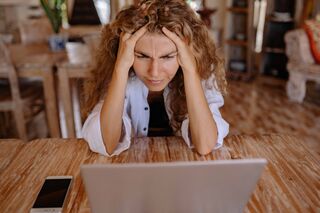Anxiety
Do You Have Cyberchondria?
If the internet is fueling your health anxiety, here’s what to do about it.
Posted August 24, 2022 Reviewed by Vanessa Lancaster
Key points
- Cyberchondria refers to excessive use of the internet to self-diagnose medical problems, leading to increased anxiety.
- For those prone to health anxiety, looking up symptoms on the internet keeps them stuck in the anxiety cycle.
- To reduce your cyberchondria and other health anxiety-related behaviors, try to delay your urge to go online and manage media use.

The past two-and-a-half years have been difficult for those prone to health anxiety. First, there has been Covid to worry about, now monkeypox. Of course, there are always "evergreen" problems like cancer, heart disease, ALS, herpes, and dementia.
And then one of the biggest problems for people with health anxiety is the internet. Excessive use of the internet by people with health anxiety to self-diagnose is so common that there's now a common term for it: cyberchondria.
Cyberchondria is not an official diagnosis; the Diagnostic and Statistical Manual of Mental Disorders (DSM-5) does not include it. The term is a pun on hypochondria, a synonym for the DSM-5 diagnosis of "illness anxiety disorder."
Why Cyberchondria is a Problem
Cyberchondria Perpetuates the Cycle of Health Anxiety. Cyberchondria can be considered a reassurance-seeking behavior. Suppose you experience a spike in your health anxiety due to a concerning symptom. In that case, you can immediately seek reassurance by going online. The problem? You can become dependent on the internet for self-diagnosis, and might feel addicted to it.
You fuel your health anxiety every time you experience an unusual symptom and go online to figure out what it means. You do not learn to tolerate uncertainty better and learn that your anxiety will naturally decrease on its own. In turn, cyberchondria continues to make you vulnerable to health anxiety.
There Could Be Catastrophe With Every Click. As someone who previously struggled with anxiety about my health, I am relieved that the internet did not exist when I was younger. Enter your symptoms into a web search, and you can be virtually guaranteed that you can find something catastrophic. A bump on the skin can be a sign of skin cancer, mild chest pain could be a heart attack, and nausea could mean a parasite is invading your body. Covid has been particularly challenging for those with health anxiety, as the CDC lists 11 possible symptoms.
It is normal to experience fluctuations in your body's symptoms and sensations; usually, it means nothing. However, suppose you have a minor headache because you had a stressful day and are mildly dehydrated from not drinking enough water. Your fearful mind can quickly morph this headache into a possible brain tumor with just a few clicks on your phone.
Cyberchondria Keeps You on Alert. Knowing that Dr. Google can give you a "diagnosis" within seconds might make you on alert, frequently scanning your body for unusual symptoms. The more you monitor your body for symptoms, the more you will find; this behavior keeps you in the cycle of health anxiety.
Tips to Reduce Your Cyberchondria
1. Assess if you require urgent medical attention. Medical emergencies do exist. Instead of going on the internet, ask yourself if your symptoms warrant a trip to the ER, urgent care, or a call to your doctor. If so, take the appropriate action immediately.
2. Delay your urge to go online. If your symptoms do not warrant urgent medical attention, try to delay or stop your urge to check your symptoms online. Even if you can't stop, delaying your urges to check can build your resilience and uncertainty tolerance.
For example, instead of going online to check your symptoms, set a timer for one minute, five minutes, 10 minutes (or even 30 seconds). When the timer goes off, you can ask yourself if you can delay checking even more. If not, congratulate yourself for waiting at least a little bit, and then set a goal for extending the time next time you have the urge to check.
3. Accept unusual body sensations. It is essential to accept that it is normal to have unusual or uncomfortable body sensations. People who don't have health anxiety often do not notice these symptoms, or if they do, they don't think much of them.
People with health anxiety are hyper-focused on their bodies. As mentioned above, the more you give your body (either by mentally paying attention to it, physically inspecting it, or doing things like paying attention to your heart rate), the more you will find.
If you find yourself tuning too much into your body, redirect your attention to something outside yourself. For example, you can look at how the leaves on the trees move in the wind outside, look at the picture on the wall, notice the colors, etc.
4. Manage your media use. If the condition you fear is frequently covered in the media, try limiting your exposure. Watching videos or TV or reading articles about your feared illness will only make things worse for yourself.
5. Be on the lookout for other reassurance behaviors. People with health anxiety tend to engage in other reassurance-seeking behaviors and cyberchondria. Do you find that you ask your partner or parent for reassurance whenever you have a weird body symptom? If so, this only keeps you stuck in the cycle of anxiety. Like your web searches, try to resist the urge to ask for your other excessive reassurance-seeking behaviors.
6. Talk to your doctor. It could be helpful to talk to your doctor about your health anxiety. Tell them you struggle with worries about your health and see if they can give any guidance about what constitutes an urgent medical situation.
The Good News
If you are prone to health anxiety, chances are you know if the internet is a problem for you. The good news is that resisting your urges to check can have positive long-term results, even if your anxiety initially increases. Also, if you are reading this post and thinking, What if something is wrong with me? I need to get answers!, remind yourself that in the not-so-distant past, there was no internet, and people managed to cope with their physical symptoms without it.
To find a therapist near you, visit the Psychology Today Therapy Directory.




